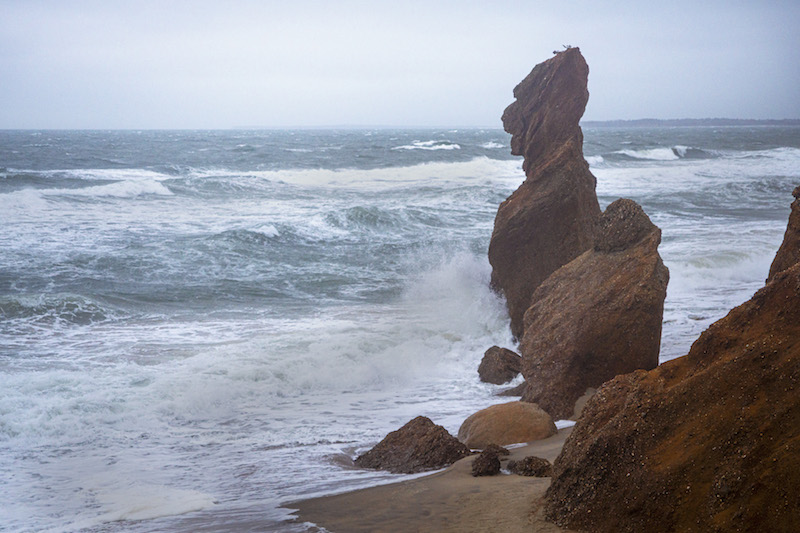Islanders need to get ready now for the effects of global climate change, Oak Bluffs conservation agent Liz Durkee told an attentive audience at the town library Saturday afternoon.
“The seas are going to rise. We are an Island community. We have to retreat from the coast,” Ms. Durkee said.
“It’s really important that the whole community start talking about these issues.”
Titled Adapt to the Impact: Climate Change Adaptation on Martha’s Vineyard, the talk was the second in a series presented by the Island Climate Action Network, a broad-based education and advocacy group that has organized around climate change this fall. More than 50 people attended.
Ms. Durkee has studied and written extensively about climate change, with a focus on adaptation. Using slides, maps and narrative, she painted a picture of Martha’s Vineyard increasingly under water as seas rise and intense storms become more frequent. She described some of the Island’s most vulnerable places, including the Martha’s Vineyard Hospital, which would be cut off in the event of a severe hurricane.
“If we get a category three hurricane, there’s no access to the hospital,” Ms. Durkee said, displaying a flood map showing the hospital’s access roads overwhelmed by a storm surge.
“Chappy Point, with a three to five-foot sea level rise, would be under water,” as would the Edgartown waterfront, she said. Aquinnah would be completely cut off if the Hariph’s Creek Bridge were flooded out.
“A one-foot sea level rise by 2040 is the lowest possible scenario,” Ms. Durkee said, with global climate change also causing flooding, erosion, acidifying ocean waters and damage to fisheries and aquaculture, among a long list of other effects.
“We are way overdue for a big hurricane,” Ms. Durkee told the audience. “The damage will be catastrophic and it will be devastating.”
She urged Islanders to take action now by responding in two ways: mitigating causes and adapting to the impacts.
She described mitigation as not only moving away from fossil fuels but also moving toward renewable energy and land use practices, such as no-till farming and protecting forests, which captures carbon in the soil and prevents it from being released as carbon dioxide into the atmosphere.
Adaptation, Ms. Durkee said, is reducing a community’s vulnerabilities to climate change, including salt marsh restoration and retreating from the coastline.
In addition to reducing fossil fuels and moving to higher land, Ms. Durkee recommended Islanders join or start their town’s Community Emergency Response Training, a FEMA program that teaches lay people to provide basic emergency services in their neighborhoods following a disaster.
The climate action network is working to place a nonbinding referendum on all six 2020 town meeting warrants that commits the Vineyard to 100 per cent energy sustainbility by 2040.
In the next presentation, set for Dec. 3 from 4 to 5 p.m. at the West Tisbury Library, Rob Hanneman will speak about the 100 per cent sustainability goal.
Mr. Hanneman is chairman of the Vineyard Sustainable Energy Committee, which represents all the Island towns’ energy committees. He will repeat his talk at the Oak Bluffs library Dec. 14 from 2:30 to 3:30 p.m.
Climate action chairman Kate Warner also announced Saturday that Philip Duffy, who heads the Woods Hole Research Center, will make a presentation to the Martha’s Vineyard Commission on Dec. 12 from 7 to 8 p.m. at the Katharine Cornell Theatre in Vineyard Haven.








Comments (10)
Comments
Comment policy »